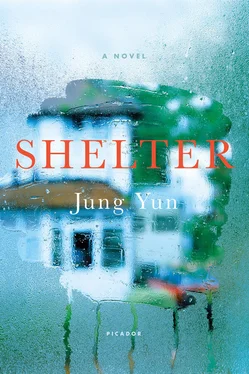Marina’s release from the hospital brings the math into sharp focus. Kyung’s three-bedroom house is too small to accommodate five adults and one child. There’s nowhere to put her except on the living room couch, where she sits and sleeps in plain, uncomfortable sight. Although Gillian won’t admit it, he thinks she regrets taking her in. Marina’s presence isn’t good for the boy; it isn’t good for anyone. One look at her is an instant, unwanted reminder of the attack, so they all scramble to leave the house in the morning, to be somewhere she isn’t. Jin takes Ethan to the park or zoo, while Kyung and Mae return to her house to clean. Gillian offers to divide her time between them, but neither pair is eager for her company, so she goes to the library or coffee shop, unaware of the slight and grateful for the time to read.
Mae is furious that Marina is staying with them. Like a scratched record that skips in the same predictable place, she suggests that Kyung send her somewhere. A home, she says vaguely. Although she never explains whose home or where this home might be, it’s obvious that if Mae could snap her fingers and make Marina disappear, she’d do so without thinking twice. Kyung assumed that his mother would have more sympathy for the girl, but no such bond or loyalty exists. If anything, they seem to operate in sharp contrast to each other. Marina’s pain medications leave her in a stupor, a state she lingers in throughout the day, while Mae is a blur of activity, focused only on returning things to right.
“A maid,” she sneers. “Who in the world would take in a maid?” Mae is standing in her living room, placing figurines on the bookshelves as Kyung looks on. “And you didn’t even ask if I’d mind.”
By now, their argument is so familiar, Kyung knows his lines by heart. “Where do you expect her to go?”
“It’s not like she’s homeless. She has an apartment of her own.”
“In a building with no elevator and six flights of stairs. Imagine Marina trying to live there without any family around to help her.”
“But why is that your problem? You barely even know her.”
“It’s not my problem — it’s Dad’s. Remember? Marina listed him on her college forms as her emergency contact.”
“So tell your father to give her some money so she can go to a hotel.”
“Why don’t you tell him?”
Mae runs her fingertip across the length of a shelf, inspecting it for dust — something she’s already done twice. She ignores his suggestion, just as he ignored hers. Kyung would like nothing more than to get Marina out of his house, but he’s never talked to Jin about money. He’s not about to raise the subject now.
“Marina needs people,” he says. “People who can check on her, make sure she’s okay.”
“Your father can buy people too.”
She makes a point of turning to look at him as she says this. Kyung isn’t sure what he sees in her eyes. Not judgment. Complicity, maybe. She goes back to her work, exchanging a small glass vase on one shelf with a set of candleholders from another.
“I don’t like coming downstairs and seeing her on the couch … the way she’s always sitting there, just staring at me.”
Earlier that morning, Kyung heard voices drifting up from the living room while he was getting dressed. He cracked his door an inch and heard his mother and Marina speaking in angry, muted whispers, the kind that people reserve for arguments they don’t want others to hear.
“What were you two talking about today? Before I came downstairs?”
Mae moves the vase an inch to the left, and then a fraction of that to the right. She crosses her arms and steps back, cocking her head as she examines her work. “I don’t know.”
“It sounded like an argument.”
“I’d remember if we had an argument.”
She didn’t answer his question, but he can tell that she doesn’t intend to. Mae walks to the center of the room and turns around in a slow circle, taking it all in. Aside from a few pale stains on the upholstery and some empty spaces on the walls and shelves, the house now resembles its former self, tidy and grand. She hasn’t thanked him for helping her all week, carting out the garbage and hefting the things she couldn’t carry. But it’s thanks enough to see things as they were, to pretend — if only for a moment — that the attack never happened because there’s no evidence that it did. Now that they’re finished with their work, he’s tempted to ask if Mae plans to move back in soon, a thought that prompts both relief and worry. It’s obvious that things still aren’t right with his parents, who continue to keep a noticeable distance from each other. He’s certain they haven’t exchanged more than a handful of sentences in days, and Jin is still sleeping on a cot in Ethan’s room every night.
“I think it’s ready,” she says.
“Ready for what?”
Mae collects her notepad from the end table, tucking her careful inventory into her bag as she sets off toward the door. She does this more often now — drift in and out of conversations, as if she’s having others that only she can hear. Kyung follows her outside and joins her in the car. The clock on the dashboard reads half past noon.
“So”—he hesitates—“should we go home now?”
She purses her lips at him, as if to hold something back. They both know what the problem is — Marina, sacked out in his living room, staring at the walls as they try to maneuver around her.
“Or maybe you’re hungry. Should I take you out to lunch?”
Mae shakes her head. Lately, she’s been eating. Not full meals yet, but small bites of things, which is better than nothing at all. For this, he has Molly and the ladies to thank. Ever since the impromptu Sunday potluck, they’ve been dropping by his house with deliveries. They’re surprisingly unobtrusive about it; they don’t even knock on the door to say hello. A cooler just appears on his steps every day. He’s not sure what to be more grateful for, the Korean food that his parents clearly prefer over Gillian’s cooking, or the lack of conversation as it’s handed off. He glances at the clock again. Only a minute has passed since he and Mae got in the car. They have hours to kill before Marina takes her midafternoon nap, when she pulls the blanket over her face and drifts off to sleep.
“Maybe you can teach me how to drive now,” Mae says.
Kyung has been waiting for this for years, but had given up hope that she’d ever want to learn. “Are you serious?”
“It’s something to do.”
“Okay, then. Let’s go.” He throws the car into reverse and backs out too fast, scraping the undercarriage against the pavement.
There’s too much traffic in the Heights to let Mae take the wheel, so he heads to the university’s athletic stadium, where the parking lot is bigger than the field. As he follows the main road around campus, ringed by classroom buildings covered in unkempt ivy, he drives past his office. The lot in front of the weathered brick building is almost half-full. His heart skips as he recognizes his colleagues’ cars. Technically, none of them are required to report to work in the summer. The break is paid time off to do their research, although Kyung hasn’t given his a moment’s thought. It’s now mid-June, nearly a month since classes ended, and it’s his first time back on campus. In another field, maybe something in the humanities, an absence like this might go unnoticed, but scientists are different. He should be here, he thinks, working in his office a few days a week, making sure everyone sees his face. Two years from now, he’s scheduled to go up for tenure, something he tries not to think about because he knows what to expect. The personnel committee will tell him that his teaching scores are just average. He hasn’t published or presented enough of his own research. And his success rate with grants is abysmal — he neither submits many proposals nor wins the few that he does. In an entirely fair world, where the process worked as it should, Kyung would be denied tenure. He hasn’t earned it, and two years is hardly enough time to catch up with his colleagues, who seem to do everything right and on schedule. The only advantage he has is his connection to Jin, who funnels millions into the campus through his grants and patent revenues. Despite the state of his finances, Kyung doesn’t worry about losing his job; he worries about what it would mean to keep it.
Читать дальше












